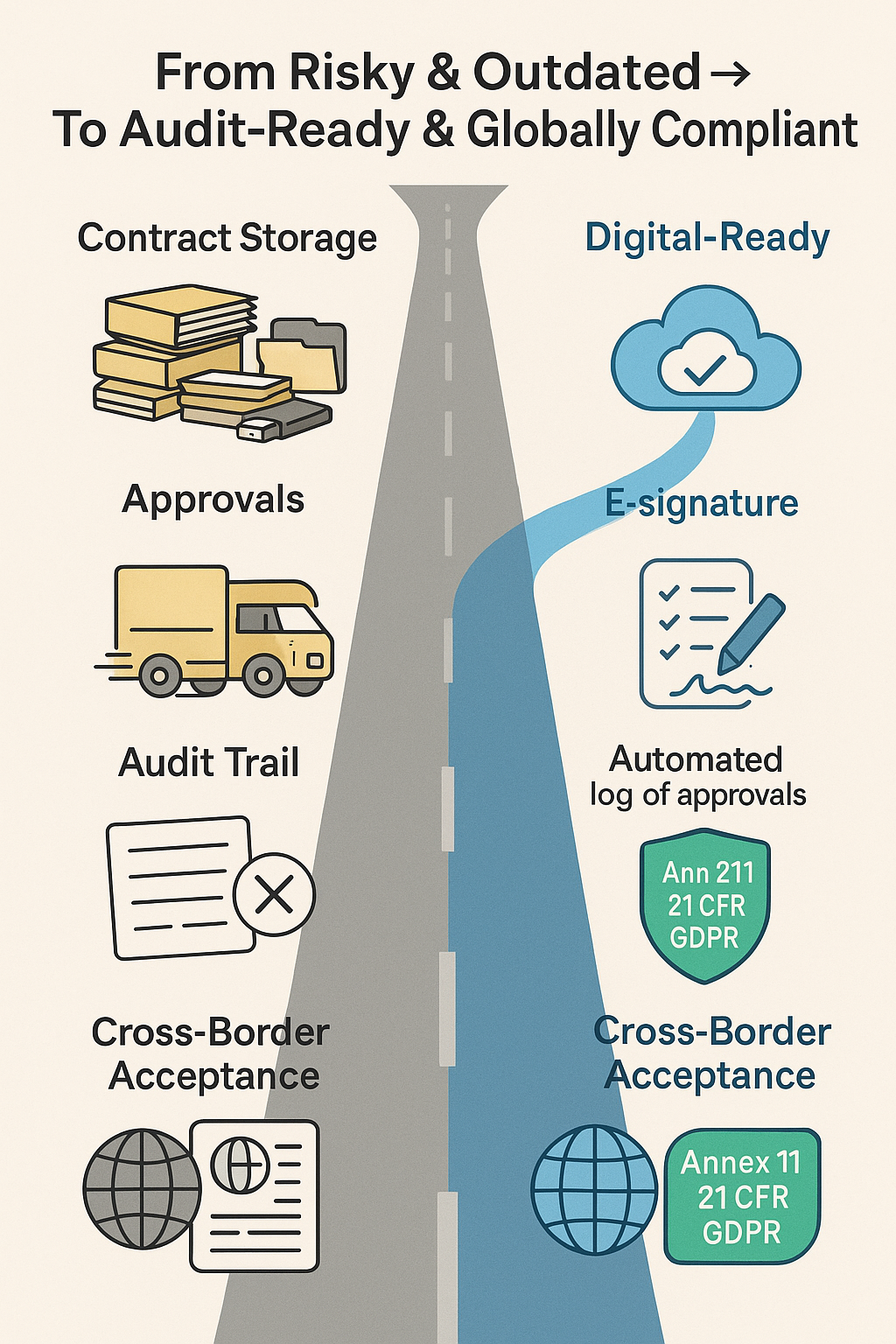In my earlier post, I reflected on how small and mid-sized firms are under constant pressure to digitize their operations while also meeting rising compliance expectations. Many still rely on manual paperwork, Excel trackers, and fragmented processes for contracts and invoices. Mor than inconvenience, it’s a structural weakness that slows growth, invites errors, and makes it harder to compete in regulated or global markets.
If invoicing is the lifeblood of business, contracts are its backbone. Both are becoming critical both for efficiency at home as well as for credibility abroad.
Why Contracts Matter (Domestic + Cross-Border)
For any business, contracts determine how work is delivered, how risks are shared, and how payments are secured. Within India, a clear contract can prevent disputes and reduce payment delays.
But in cross-border business, contracts serve as tests of reliability. Global buyers increasingly expect contracts that are digital, traceable, and audit-ready. A paper contract may be acceptable locally, but a foreign partner may see it as a red flag.
Contracts are not passive paperwork; they are gateways into markets. Domestically, a missing clause or a late signature may cause delay. In global trade, the same gap can close doors entirely.
And contracts don’t exist in isolation. They flow directly into invoicing. If contract terms are unclear, or if multiple versions are in circulation, invoices get delayed. In exports, this can stall customs clearance or slow down foreign remittances. A weak contract carries legal risk as well as it disrupts cash flow.
Common Struggles for SMEs
SMEs face recurring problems in how they handle contracts and invoices:
- Fragmented storage → files scattered across folders, email threads, and pen drives.
- Manual approvals → couriered signatures and long approval chains that feel outdated to global partners.
- Version confusion → multiple drafts create disputes and mismatches.
- Weak audit trails → no clear record of who signed, when, or under what authority.
- Lack of traceability → especially in exports, where buyers want visibility into sourcing and supply chains.
- Invoice delays linked to contracts → unclear terms or mismatched documents delay payments and, in exports, can hold up shipments.
While these challenges are common, they are increasingly being addressed by integrated, cloud-based platforms that centralise contracts, approvals, and invoicing with built-in compliance checks. The pertinent question now is not if SMEs can digitise, but when.
The irony is that SMEs often have the capacity and pricing to win contracts but they lose opportunities because their documentation practices do not meet modern expectations.
The Compliance Lens: India & Beyond

Compliance has shifted from being a back-office task to a frontline business requirement.
In India:
- GST & e-invoicing rules require standardized digital invoicing.
- SEZ exporters need accurate records to claim benefits.
- Company law increasingly demands digital approvals and records.
Already, SMEs are expected not just to “file correctly,” but to maintain audit trails that prove compliance.
Globally:
- EU Annex 11 → electronic records and signatures with audit trails (Pharma).
- US 21 CFR Part 11 → governs digital traceability (pharma).
- GDPR → impacts IT and outsourcing contracts involving EU data.
- EU VAT & e-invoicing mandates → standardisation spreading across Europe.
- ESG reporting → buyers must prove sustainable supply chains.
- CBAM → carbon traceability required for imports, affecting suppliers indirectly.
Most SMEs still depend on paper or semi-digital methods. But without digital audit trails and traceability, they risk exclusion from tenders, delays at customs, or rejection by buyers.
Why Manual Methods Persist
If the pressure is so high, why do SMEs resist change?
- Cost perception → assuming digital tools are unaffordable.
- Awareness gap → not realising global rules (Annex 11, GDPR, CBAM) apply indirectly.
- Fear of audits → belief that paper gives more control, when in fact it weakens compliance.
- Workflow inertia → the perceived disruption of changing familiar processes outweighs the abstract fear of future penalties.
- Short-term focus → treating compliance as something to “fix later.”
In reality, the barrier is not technology but mindset and guidance.
Practical Steps SMEs Can Take
The path forward doesn’t have to be overwhelming. SMEs can start small:
- Digitize contracts first → use a cloud-based contract management platform with role-based access and version control.
- Build audit trails → adopt tools that log approvals digitally, showing who signed, when, and under what authority.
- Connect contracts and invoices → align invoicing directly with contract terms to reduce disputes and speed up payments.
- Adopt modular tools → choose systems with API integrations for Tally, Zoho, or SAP to avoid data silos.
- Plan for ESG and CBAM early → begin with simple steps, like recording energy use or material sources in a standardised spreadsheet for your main product line.
- Train teams → ensure staff understand why audit trails and traceability matter, not only to avoid penalties but to win trust in global supply chains.
The Road Ahead: Domestic to Global
The world SMEs operate in is changing fast:
- Compliance will move upstream → even smaller vendors will be audited for digital readiness.
- ESG reporting will shape decisions → buyers will expect SMEs to prove sustainable practices.
- CBAM will redefine export readiness → carbon traceability will become as important as pricing.
- Digitization will become a competitive edge → SMEs with audit-ready systems will be trusted as scalable partners.
Advisory Note: SMEs don’t have to navigate this alone. The challenge often lies in knowing which tools or partners fit best for their sector. A textile exporter has very different compliance needs from an IT services firm, and a domestic supplier faces different priorities than one entering Europe.
For SMEs starting this journey, choosing the right partner early is critical. It can make the difference between being blocked at the border and being welcomed into global supply chains.
